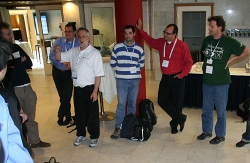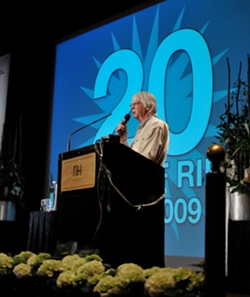 Total Attendees: 422
Total Attendees: 422
The RIPE 58 meeting kicked off on Monday, 4 May 2009, with a focus on industry cooperation with government, law enforcement and the public sector. The first session of the day, the RIPE Cooperation Working Group, was centred around the theme of IPv6 adoption and featured updates on government strategies.
A panel discussion examined why IPv6 had not yet been widely adopted by business. The RIPE NCC gave an update on cooperation activities and the audience discussed the role of regulation in government Internet strategies. Marijn Schuurbiers (Dutch National Police Services Agency) introduced the idea of creating a RIPE Cybercrime Task Force.
The final session of the day, chaired by Remco Van Mook (Equinix), concluded with several presentations on capacity planning.
IPv6 Deployment
On Tuesday, the morning Plenary session was given over to IPv6, with presentations on deployment experiences and trials.
The afternoon session featured an “Overview of DNSSEC Trust Anchor Repositories (TARs)” by Ólafur Guðmundsson of Shinkuro Inc., which prompted intense audience discussion on the merits of DNSSEC TARs. UCLA’s Eric Osterweil continued the DNSSEC theme, looking at “Availability Problems in the DNSSEC Deployment”, while Ethan Katz-Bassett of the University of Washington presented his work on Reverse Traceroute.
The IPv6 Working Group session featured a presentation by Google’s Lorenzo Colitti on Google’s IPv6 activities and an overview of IPv6 Teredo and 6to4 experiences by Martin J. Levy of Hurricane Electric. Maarten Botterman of TNO also invited the RIPE community to take part in an EU IPv6 Deployment Survey. Lively discussion on several presentations proved that IPv6 continues to be a hot topic for the RIPE community.
During Wednesday’s Address Policy Working Group session, it was announced that the IPv6 Provider Independent (PI) Assignments policy proposal (2006-01) has been implemented by the RIPE NCC’s Registration Services (RS) department. RS is now ready to receive requests.
AS Number Pools 
Daniel Karrenberg, the RIPE NCC's Chief Scientist, asked for input on how to deal with the assignment of 32-bit only and 16-bit bit AS Numbers as of January 2010. The general opinion was that the RIPE NCC could continue to assign 32-bit only and 16-bit AS Numbers as they do now. When the distinction between 32-bit only and 16-bit AS Number pools disappears in January 2010, it could have an effect on the RIPE NCC receiving ASN blocks due to the low usage of the 32-bit only block that the RIPE NCC already has. It may mean that the RIPE NCC would not qualify to receive a new 16-bit ASN block even though there seems to be a demand for 16-bit ASNs. The attendees seemed to be agreement that this situation should be dealt with on a global level.
There appeared to be agreement about proposals 2009-02, “Internet Resource Assignment to the RIPE NCC” and 2008-05, “Anycasting Assignments for TLDs and Tier 0/1 ENUM”. The discussion will be continued on the mailing list and both will probably move to next phase soon.
The 2009-03, “Run Out Fairly” proposal from Daniel Karrenberg also received good feedback and the discussion will continue on the mailing list. The proposal will probably move to next stage.
The EIX Working Group met after lunch on Wednesday, with regular updates from Internet Exchanges throughout the RIPE NCC Service Region and beyond. There was also an update from Euro-IX that focused on strong growth in the amount of IX traffic in Europe over the past year.
Hot Topic
 DNSSEC was the hot topic for those attending the DNS Working Group, with reports from a range of technical meetings and symposiums. Progress towards the signing of the root continues and it was noted that ICANN have pledged that this will happen by December 2009. It was a packed session with plenty of people ready to ask questions and praise the work being carried out globally.
DNSSEC was the hot topic for those attending the DNS Working Group, with reports from a range of technical meetings and symposiums. Progress towards the signing of the root continues and it was noted that ICANN have pledged that this will happen by December 2009. It was a packed session with plenty of people ready to ask questions and praise the work being carried out globally.
The RIPE NCC Services Working Group provided a forum for extensive community discussion about Internet number resource certification and how the RIPE NCC should move forward with this project. Discussion on this will continue on the working group mailing list. The working group also honoured past RIPE NCC Executive Board Chairman Kees Neggers and Board Member Jim Reid for their service.
An IPv6 Peering BoF took place on Wednesday at 16:00 with 18 people attending. The BoF attendees discussed their experiences with implementing IPv6 in their networks. They agreed to meet again at future RIPE Meetings.
Global Policy
On Thursday, during the Address Policy Working Group, the RIPE NCC Managing Director, Axel Pawlik, presented policy proposal 2009-01, “Global Policy for the allocation of IPv4 blocks to Regional Internet Registries”. There seemed to be agreement to go forward with ARIN’s version of the proposal which makes the return of legacy space mandatory and the return of other address space optional.
The feeling from the session’s attendees was that most people seem to favour proposal 2009-04, “IPv4 Allocation and Assignments to Facilitate IPv6 Deployment” over proposal 2008-06, “Use of Final /8”. The decision about which proposal will go forward will be made on the mailing list.
It was also decided that proposal 2008-07, “Ensuring Efficient Use of Historical IPv4 Resources” needed further review and discussion on the mailing list.
Andy Davidson presented an idea for a new proposal to make IPv6 PI space possible for LIRs. The general feeling from the discussion was that getting address space should be determined by need and not by whom you represent. There is need for further discussion and feedback on the mailing lists after which a formal proposal can be drafted.
Lively Discussion
During the second session of the DNS Working Group, there was a lively discussion about the future of RIPE NCC DNS lameness checks with the value of the work questioned. The group agreed the RIPE NCC should continue analysing and fine-tuning the service and report back at the RIPE 59 Meeting in Lisbon in October.
Pre-delegation checks also came under scrutiny. Although most of those in the room saw their value, there was concern about imposing uniformity in how the checks are carried out across ccTLDs.
Highlights of the Routing Working Group session included Danny McPherson’s talk about intra-domain BGP scaling problems, detailing route reflections and network architecture considerations and Greg Shepherd’s extensive introduction into video streaming on the Internet. The Chairs announced there was to be a slot in the closing plenary on Friday to discuss recent changes to IPv6 address policies and how they would affect the global routing tables.

Rob Blokzijl marks 20 years of RIPEThe Anti-Abuse Working Group saw intense discussion around Robert Bruen’s presentation on “How to Use Policy Enforcement to Stop Abuse”, as well as an update on “Botnets and Badguys” from the WG co-Chair Richard Cox.
Congratulations went to Andy Davidson who was elected as the new co-Chair of the EIX Working Group.
20 Years of RIPE
RIPE 58 also marked an important milestone – 20 years since the first RIPE Meeting!
There was a dedicated 20 Years of RIPE Plenary session on Thursday afternoon, along with a commemorative RIPE Dinner in the evening, celebrating RIPE’s anniversary in style.
During the Thursday session, Rob Blokzijl, who has been RIPE Chair since its inception, presented a history of RIPE to a packed room, followed by the RIPE NCC's Chief Scientist, Daniel Karrenberg's humourous account of how RIPE got its name. Many of the original founders of RIPE were in the audience as special guests and received gifts of appreciation. Rob also presented prizes to five of the 130 first-time RIPE Meeting registrants.
Closing
The Address Policy Working Group continued its discussion during Friday morning's Closing Plenary. Following a presentation by Rob Evans on "IPv6 Routing Considerations", there seemed to be agreement from the attendees that the routing requirements should be removed from the 'IPv6 Address Allocation and Assignment Policy' document. However, it was noted that the routing recommendations should be documented properly elsewhere. Work will be done to propose this formally on the Address Policy mailing list.
The meeting came to a close after the RIPE NCC's Razvan Oprea gave an overview of the meeting's technical set-up.
The next meeting will take place in Lisbon, Portugal, from 5-9 October, 2009. We hope to see you there.


